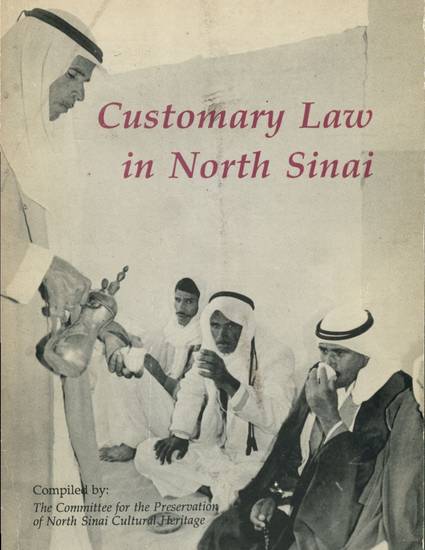
Book
(Translation) Customary Law in North Sinai, by Kamal Abd Allah al-Hulw and Said Mumtaz Darwish
(1989)
Abstract
One of the most distinctive features of the conceptual life of Bedouin society in northern Sinai is its reliance on customary law to settle its disputes. This unwritten legal system, based on custom, precedent, and general consent, aims at the amicable resolution of disputes between individuals or tribes through mediation, litigation, and the payment of compensation. The body of customary law has been handed down from generation to generation by hereditary judges, each of whom specializes in a particular type of law. The value of this complex and highly sophisticated means of redress for wrongs has been recognized by civil authorities, so that it has become a legally valid alternative to litigation through the civil court system.
This publication presents a detailed discussion of tribal customary law in northern Sinai, consisting of three parts: part one presents the types of law and the jurisdictions of their judges; in part two, the terms and concepts underlying this legal system are defined; part three describes the procedures for hearing cases before the judges, giving examples, transcribed in Bedouin dialect, of the formulaic expressions used by plaintiff and defense to present their arguments. Appendices provide: additional examples of formulaic complaints; the text of legislation passed in 1980 regarding the incorporation of customary-law committees made up of experienced tribal judges into the civil law system of the governorate of northern Sinai; and the names and specialties of the judges consulted in the course of the fieldwork. The English edition includes a glossary of Bedouin dialect terms, proverbs, and formulaic expressions appearing throughout the book. Black-and-white photographs of customary-law court sessions and aspects of daily life in the region illustrate the text.
Cited in:
Bailey, Clinton. 1993. "The Role of Rhyme and Maxim in Bedouin Law." In New Arabian Studies, vol.1, pp. 21-35.
Bailey, Clinton. 2009. Bedouin Law from Sinai and the Negev: Justice Without Government (New Haven, Ct.: Yale University Press).
Dijkstra, Meindert. 1999. "YHWH as Israel's Gōʾēl: Second Isaiah's Perspective on Reconciliation and Restitution." In Zeitschrift Für Altorientalische Und Biblische Rechtsgeschichte / Journal for Ancient Near Eastern and Biblical Law vol. 5, pp. 236-257. (fn. 41, p. 246)
Dresch, Paul. 2006. The Rules of Barat: Tribal Documents from Yemen. Sanaa: Centre français d’archéologie et de sciences sociales.
Peters, Rudolph. 1999. "An Administrator's Nightmare: Feuding Families in Nineteenth Century Bahariyya Oasis." In Legal Pluralism in the Arab World, ed. Baudoin Dupret et al. (The Hague: Kluwer Law International), pp. 135-144.
Sarnowski, Andrea von. 2010. The Role of Indigenous People in National Development Processes: Participation and Marginalisation of Indigenous Bedouin in South Sinai Tourism Development (Inauguraldissertation, Dr. phil., Johannes-Gutenberg Universitat, Mainz)
Sonbol, Amira El-Azhary. 2004. "Muslim Women and Legal Reform: The Case of Jordan and Women's Work." In Islamic Law and the Challenges of Modernity, eds. Yvonne Yasbeck Haddad and Barbara Freyer Stowasser (Walnut Creek, Calif.: AltaMira Press), pp. 213-234.
Stewart, Frank H. 2003. "The Contract with Surety in Bedouin Customary Law." In UCLA Journal of Islamic and Near Eastern Law, v. 2 no. 2, pp. 163-280.
Keywords
- Middle East studies,
- Ethnography,
- Arabic Language and Linguistics,
- Proverbs,
- Egypt,
- Customary Law,
- Sinai,
- Bedouins,
- Bedouin
Disciplines
Publication Date
1989
Publisher
Committee for the Preservation of North Sinai Cultural Heritage
Citation Information
Roberta L. Dougherty. (Translation) Customary Law in North Sinai, by Kamal Abd Allah al-Hulw and Said Mumtaz Darwish. (1989) Available at: http://works.bepress.com/bintalbalad/33/
